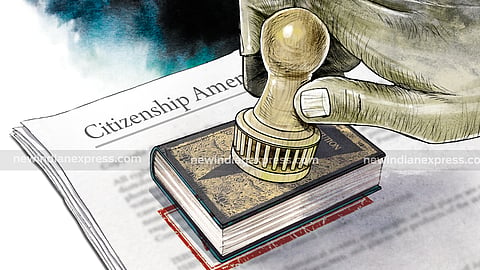

NEW DELHI: The Centre on Monday notified the rules for implementation of the controversial Citizenship (Amendment) Act (CAA) 2019. This will now pave the way for granting Indian citizenship to undocumented migrants from minority communities in Pakistan, Bangladesh and Afghanistan, according to the notification.
Union Home Minister Amit Shah in a post on ‘X’ said, “These rules will now enable minorities persecuted on religious grounds in Pakistan, Bangladesh and Afghanistan to acquire citizenship in our nation.”
“With this notification PM @narendramodi Ji has delivered on another commitment and realised the promise of the makers of our constitution to the Hindus, Sikhs, Buddhists, Jains, Parsis and Christians living in those countries,” Shah noted.
The Congress and other opposition parties, however, slammed the government’s move, alleging that it was designed to polarise the coming Lok Sabha elections, especially in West Bengal and Assam.
With the rules being notified under the CAA, the government will now start granting Indian citizenship to persecuted non-Muslim migrants from the neighbouring Islamic countries - Bangladesh, Pakistan and Afghanistan - who have come to India on or before December 31, 2014. The decision has come nearly a month ahead of the elections for the Lok Sabha.
In the notification the MHA said, “These rules, called the Citizenship (Amendment) Rules, 2024 will enable the persons eligible under CAA-2019 to apply for the grant of Indian citizenship. The applications will be submitted in a completely online mode for which a web portal has been provided.”
According the rules, an applicant has to upload on the portal “affidavit verifying the correctness of the statements made in the application along with an affidavit from an Indian citizen testifying the character of the of the applicant” and also “a declaration… that he/she has adequate knowledge of one of the languages as specified in the Eighth Schedule of the Constitution”.
It said, “Every application made by the applicant shall have a declaration to the effect that the citizenship of his country shall stand renounced irrevocably in the event of his application being approved…”
Furthermore, while sharing an explainer on the CAA, the MHA said, “The Constitution of India grants us the right to provide religious prosecuted refugees with fundamental rights and to grant citizenship from a humanitarian perspective.”
The CAA was passed in December 2019 and subsequently got then President Ramnath Kovind’s assent but this led to violent protests in several parts of the country with many opposition parties speaking out against the law calling it “discriminatory”. The law could not come into effect as rules had not been notified till now.
Over 100 people lost their lives during the anti-CAA protests. On Monday, security was stepped up in Shaheen Bagh, Jamia and other areas of the national capital as well as in various states where anti-CAA protests were held in the past.
According to the Manual on Parliamentary Work, the rules for any legislation should be framed within six months of presidential assent or the government has to seek an extension from the Committees on Subordinate Legislation in Lok Sabha and Rajya Sabha.
In the last two years, over 30 district magistrates and home secretaries in nine states have been given powers to grant citizenship to Hindus, Sikhs, Buddhists, Jains, Parsis and Christians coming from Afghanistan, Bangladesh and Pakistan under the Citizenship Act, 1955.
According to the annual report of the MHA for 2021-22, from April 1, 2021, to December 31, 2021, a total of 1,414 foreigners belonging to these non-Muslim minority communities from the three countries were given Indian citizenship by registration or naturalisation under the Citizenship Act, 1955.
The nine states where Indian citizenship by registration or naturalization is given under the Citizenship Act, 1955 to non-Muslim minorities from Pakistan, Bangladesh and Afghanistan are Gujarat, Rajasthan, Chhattisgarh, Haryana, Punjab, Madhya Pradesh, Uttar Pradesh, Delhi and Maharashtra. Authorities of none of the districts of Assam and West Bengal, where the issue is politically very sensitive, have been given the powers so far.
CAA timeline
December 11, 2019: Parliament passed the Citizenship (Amendment) Bill (CAB) 2019.
December 13, 2019: Then President Ram Nath Kovind gives his assent and established it as the CAA.
December 2019 - Early 2020: Nationwide protests erupt in response to the CAA.
December 15, 2019: Women of Shaheen Bagh commence an indefinite sit-in protest in Delhi to the Act.
December 15, 2019: BJP leader Kapil Mishra conducts a rally in support of the CAA.
January 30, 2020: A gunman opens fire at anti-CAA protesters near Jamia Millia Islamia, causing injuries.
February 2020: Student-led demonstrations intensify, resulting in clashes with police in various states.
February 23, 2020: Delhi experiences communal violence.
Post-February 2020: Legal challenges emerge, questioning the constitutional validity of the CAA.
Since 2020, the MHA has taken permission for more time at regular intervals from the parliamentary committee for framing the rules, as the rules for any legislation should be framed within six months of presidential assent.
December 27, 2023: HM Amit Shah reiterates the government’s commitment to implementing the CAA, dismissing opposition claims.
January 29, 2024: Union Minister Shantanu Thakur declares at a public rally in West Bengal that the CAA will be implemented across all states in India within seven days.
Feb 10, 2024: HM Amit Shah reiterated that rules for implementing CAA would be issued before the coming Lok Sabha polls.
March 11, 2024: The government notified the implementation of the CAA.